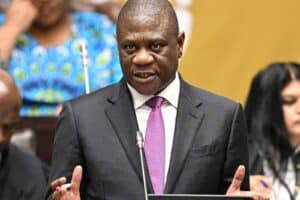Political scientists, epidemiologists, and doctors agree that politicians - with their heavy-handed authoritarianism, booze bans and cigarette wars - have done more harm than good in fighting the pandemic.

Covid-19 has exposed how even governments as ostensibly liberal as South Africa’s can abuse their authority in times of crisis and how political power sometimes trumps the need to save lives.
This was the sentiment of analysts in the wake of the government facing political pressure to open up about its Covid-19 vaccination plan and policy.
From the onset of the National State of Disaster declared on 15 March 2020, the country slipped into an era of unprecedented state control in the new democracy. The declaration of the State of Disaster removed parliamentary oversight of government decisions related to the pandemic, and concentrated decision-making power in the National Coronavirus Command Council, overseen by Cabinet.
But despite the utterances of President Cyril Ramaphosa and members of his Cabinet against the use of excessive force by police, and statements of national unity, when it came to the crunch, it eventually became necessary for civil society to step in to fight attempts by government to exert power unnecessarily said political analyst Ralph Mathekga.
Did sandals really have to be banned?
Examples of this have been the various items banned from sale in the earlier months of 2020, which at some point included shorts and open-toed shoes.
ALSO READ: Tax increase ‘not an option’ for Covid-19 vaccine funding
“They played the authoritarian, or maybe they focused a lot more on authority than on consensus. One thing that one can say is you need collective reasoning. I mean at some point they even shut down Parliament and they had to face backlash when they tried to close the courts. The chief justice had a problem with that. Parliament had a problem operating functionally so the executive overindulged with power,” Mathekga said.
Much of the policing reported and witnessed around the Covid-19 regulations happened in the townships and less so in the suburbs. The poor also continued to be the most vulnerable to the other negative effects of the Covid-19 response. From sweeping job losses to the shutting down of entire operations in the informal sector, South Africa’s poor bore the brunt of the economic fallout of the pandemic.

A man is arrested by the metro police for breaking the lockdown laws during a joint South African Police Services (SAPS) and South African National Defence Force (SANDF) patrol on day 31 of the national lockdown as a result of the ongoing coronavirus pandemic in Johannesburg on 26 April 2020. Picture: EPA-EFE/Kim Ludbrook
“The imbalance here is that the poor are the ones that are always hard-hit by any excessive measure. The rich can defend themselves and also those who live in areas where people have access to information and know about their rights,” said Mathekga.
Using force over education helped no one
Epidemiologist Dr Jo Barnes had long complained that politics mired the Covid-19 response in South Africa in a similar fashion to the political fallout of Covid-19 in the US. Where former president Donald Trump employed the politics of chaos and anarchy, South Africa seemed to have descended into a lighter version of authoritarian rule. One in which, she lamented, scientific consensus gave way to political will at a time where every decision could have meant lives saved or lost.
ALSO READ: Covid-19 vaccination cards, pre-registration: Inside SA’s plan to vaccinate 40 million people
“The ANC employed a communist style authoritarianism in policing people’s behaviour, instead of trying to educate people of the reasons behind the regulations being put in place and because of that lack of consultation they ended up with some elements of irrationality in their planning,” said Barnes.
In the US, political will to encourage mask wearing was weak, and Trump supporters notoriously refused to wear them until around 200,000 people had died of Covid-19 in that country last year. In South Africa, said Barnes, police conducted random raids on people, mostly in poor areas, arresting them for not wearing masks in areas where not a single education campaign around Covid-19 had been conducted.
Between 14 July and 20 July last year, around the time the pandemic’s first wave peaked, the Centre for Analytics and Behavioural Change (CABC) ran a query on signs of civil unrest on social media, and found that no fewer than 40 separate protests had taken place.
Spokesperson for the South African Medical Association, Angelique Coetzee, said some of the government’s decisions around Covid-19 were poorly informed, and explained even from a medical point of view.

A shopkeeper packs well-known brands of cigarettes in his shop, as cigarettes are unbanned, in Athlone, Cape Town, on 18 August 2020. South Africa moved into level two of a five-tier lockdown to continue efforts to curb the spread of Covid-19. Picture: Rodger Bosch/AFP
“It’s the fact that the ban on cigarettes was done without any plan. We know that smoking has negative effects on health but you can’t simply institute a ban without any programme for rehabilitation. You can’t just take away cigarettes from someone who has been smoking for 20 years.
ALSO READ: Continued booze ban could shatter SA’s glass industry, says Consol
“The problem with the alcohol ban is while we understand the many medical problems with alcohol, we need to deal with the primary problem of why we are such a violent and heavy drinking country. But rather than address the real issues they just close down alcohol sales which has an economic impact to be considered as well.”
For more news your way, download The Citizen’s app for iOS and Android.






